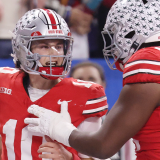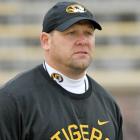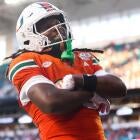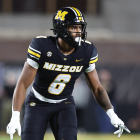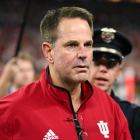Barry Odom frustrated with rival SEC coaches trying to poach Missouri seniors after bowl ban
Odom is particularly perturbed with Tennessee's constant efforts to take some of Mizzou's 19 seniors
KANSAS CITY, Mo. -- Barry Odom will have some choice words for his fellow SEC coaches on Wednesday. Missouri's head football coach is just now realizing the full impact of probation recently handed down by the NCAA that included a bowl ban in 2019.
Odom said Tuesday that his 19 seniors are being "contacted and bombarded non-stop" by teams taking advantage of NCAA bylaws that allow rising seniors from programs hit with postseason bans to transfer without penalty.
Odom singled out Tennessee as the most frequent caller for his players among SEC programs during a booster event on Tuesday.
"Everybody is going to have a bad day," Odom said, expressing his frustration with keeping his players from transferring. "You combine that with somebody that -- who'd we beat 51-17 this year? Tennessee? Yeah, those guys. They are non-stop reaching out daily [saying], 'Hey, come here.' The grass is not always greener somewhere else."
Tennessee did not have a comment when contacted by CBS Sports about Odom's stance.
On Jan. 31, Missouri was hit with a bowl ban and significant recruiting restrictions in an academic misconduct case involving a former tutor. It is appealing the penalties citing "abuse of discretion" by the NCAA infractions panel that worked the case.
"I think [the decision] calls into question the affect on the future of intercollegiate athletics," Missouri athletic director Jim Sterk told CBS Sports.
In the meantime, virtually all of the penalties -- including the bowl ban -- are delayed until the appeal is heard. Not delayed is the opportunity for Odom's seniors to transfer elsewhere. That will be the case until fall drills commence in August.
No Missouri players have transferred due to the ruling, but Odom and Missouri remain frustrated.
"I'm also now recruiting our senior class again," Odom said.
The coach said that he has "made a number of calls" to conference peers pursuing his players. This comes in advance of Wednesday's annual SEC coaches' meeting at the league headquarters in Birmingham, Alabama.
"I haven't gotten return phone calls," Odom said.
"I know there is a handful of guys who are talking daily to my players," he added. "That's going to be a fun luncheon tomorrow."
Since 1992, NCAA legislation has existed that allow athletes with remaining eligibility to transfer without sitting out. As chief hearing officer in the Missouri case, David Roberts invoked some of that legislation in recommending the players' freedom. Roberts is the special advisor to the USC president.
Missouri's frustrations are similar to those at Ole Miss and Penn State in recent years. Rising seniors in 2018 were allowed to transfer from Ole Miss after the school was hit with an additional year of a postseason ban. The school had already self-penalized itself a one-year bowl ban. Penn State was initially hit with a four-year postseason ban as a result of the Jerry Sandusky scandal in 2012. Juniors and seniors were allowed by the NCAA to transfer immediately.
State College, Pennsylvania, suddenly became the go-to site for talent scavengers. Former Illinois coach Tim Beckman flew eight assistants to Penn State. Rival recruiters were literally hanging out in the football facility parking lot. Former player Matt Mauti recalled that he got 40 scholarship offers -- as a senior.
Obviously, it's not that bad at Missouri. But in an academic year when the transfer portal became a part of the game, the exasperation is mounting with Odom.
"They're all getting bombarded," he said of his seniors. "It's frustrating ... that our governing body has allowed that. You can't cut a player. You can't remove a player for not being a good player or injury, but yet, they let people go recruit our guys. Ole Miss, Penn State, Missouri. Really? We're in the same boat."
Odom told the Kansas City Tiger Club on Tuesday that he learned about the penalties in late January while driving. A Mizzou official advised him to pull over before reading him the details.
"The only thing I heard about or thought for three years as a head coach was [we] may have to vacate wins," Odom said. "[A bowl ban] was not even on my radar."
Odom enters his fourth season as head coach an even 19-19. He's coming off his best season after leading the Tigers to an 8-5 finish following a Liberty Bowl loss to Oklahoma State.
"We're messed up on a lot of different levels when it comes to transfers," Odom said of the sport in general. "Some of that has to do with coaches leaving. ... Also, the integrity of how you recruit that has something to do with it, too."
Details of Missouri's appeal have surfaced in another age when the NCAA is being criticized for overreach on penalties.
Missouri is basically arguing that the punishment doesn't fit the crime. All parties agree that Missouri took immediate action, alerting the NCAA after the academic fraud became apparent.
"You would need the FBI and to check it any closer [than we did]," Sterk told CBS Sports. Sterk later said the penalties were "shocking, I guess, was the best way to put it. There was no precedent for what occurred."
As part of that stance, Missouri is contending "there was no heat in the room" at the infractions hearing. Missouri originally proposed a simpler summary disposition in the case. The enforcement staff basically agreed with Missouri in supporting summary disposition. The enforcement panel of four disagreed saying a full investigation should be conducted.
Missouri pointed out credibility problems with the tutor, Yolanda Kumar, who was on record wanting to sell the information she had accumulated. Kumar initially told the St. Louis Post-Dispatch she committed academic misconduct with 42 Missouri athletes. Eventually, only nine athletes competed while ineligible.
Sources told CBS Sports that part of the appeal will surround the fact neither Odom nor the softball and baseball coaches whose athletes may have been involved were interviewed by the NCAA. Odom had only been on the job for six months when any infractions may have occurred. The case involved only one baseball and softball player each as well as seven football players.
Missouri at least has issue with Carol Cartwright, a member of the infractions panel. The former Bowling Green president is currently a member of the reform-minded Knight Commission as well as the Division I Academic Misconduct Working Group. That group is seeking a clearer definition of academic misconduct. Given that background, Missouri may suggest Cartwright should have recused herself from this particular case.
As for changing the world after being the latest school to speak up after perceived NCAA overreach, Sterk will settle for calming things in mid-Missouri.
"If the crisis did anything, it mobilized our base," Sterk said, pointing out a statement from state Senator Roy Blunt.
"We're pushing for corrective action. How far reaching, I'm not sure."





